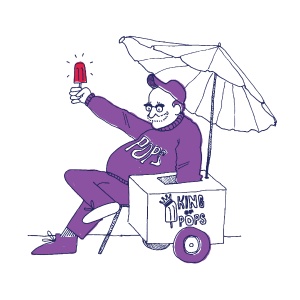I grew up in a family of readers, but a reader I was not.
In school, I did the required reading, but little more than that.
That all changed in my twenties when I started King of Pops. The collision of something I cared deeply about and my undeniable lack of experience were fertile ground for absorbing knowledge through books.
Org charts, company culture and effective management techniques quickly went from forgettable to fascinating.
Suddenly I was reading multiple books in a week. If I went on a long road trip I might listen to two new audio books in a day.
It’s hard to describe the feeling I would get when I was connecting deeply with something I was reading. In the safe confines of my brain, everything the author was posing seemed both immediately implementable and incredibly impactful. I felt a shortness of breath as I rushed through the pages eager to “give it a try.”
Early on, with a small headcount, it was super easy to test new ideas. And test we did. Everyone on the young King of Pops team got used to zigging and zagging whichever way the latest book directed. The team would nod politely as I butchered a summary of the book, the reasons we should make this change, and why everything was going to be “ok” now.
Over time I’ve begun to realize that every ideas in a business book isn’t a good idea for us to do right away. Patience is not my superpower, but I saw first hand that doing something thoughtfully was far more impactful than doing something quickly.
All the poking and prodding was certainly not effective, but I was hooked on learning more about running an effective business. I’ve kept up the reading habit, and while business books have earned their reputation of regurgitating the same ideas over and over, certain themes started to consistently resonate with me.
Since starting King of Pops I’ve read about two hundred business books. Three of the books more than any others continue to shape how I approach building our business.
If you’re just getting started or are feeling stuck I couldn’t recommend them more highly.
Why I love it: The tagline for this book says it all. I immediately connected with the idea that bigger doesn’t mean better. This book made it ok, even admirable, to grow in a sustainable, self funded, and steady way. Not only was this trajectory intriguing, it was the only option I had as investors for our fledgling popsicle company weren’t coming out of the woodwork.
The book is broken up into sections and highlights very successful, interesting small companies you probably wouldn’t have heard of otherwise.
One of the companies that is highlighted in Zingerman's, a deli in Ann Arbor Michigan, quickly became the business I most look to for inspiration. There is so much to love about their approach to business, and early on it led to a small group of us to attending a visioning training at one of their spinoff businesses, ZingTrain.
All of their community of businesses (I think there are 14 now and it’s called Z COB) are in Ann Arbor and their vision is to stay in Ann Arbor, but grow with new employee partners starting new businesses. ZingTrain was one of those businesses and we continue to send folks to their workshops, borrow their ideas and learn from their approach.
How we use it: This book introduced me to Zingerman's and SRC Holdings, which led to research and eventually relationships with people who had first hand experience operating a small business with a novel approach.
Why I love it: SRC Holdings was another one of the companies highlighted in Small Giants. I was immediately impressed with how such a “blah” business category, remaking engines, was operating in such a novel way.
This book lays out an argument and a specific plan on how to implement open book management. After reading, and trying it on our own for a few years, Nick and I travelled to Springfield Missouri to attend a workshop.
How we use it: We had been “kinda” open book since day one. After going to their conference we realized that open book management is more than just making the financials available. It is a never ending process of teaching, identifying how team members can impact the numbers, and sharing in the success.
I’m not a big finance guy, so the teaching part really helps me learn the content.
This book, more than any other, had my head spinning as I was reading it. I’ve since read many tactical business books that are similar, but in my opinion, for small businesses this one still stands alone as the best.
the first time I read this book I felt like there could be clarity in our business in a way I hadn’t imagined before. The book outlines EOS (Entrepreneurial Operating System), which is a system to run all facets of your business and is prescriptive on how to implement it.
How we use it: We spent several years self implementing and eventually worked with an implementor for another couple of years. It continues to be the backbone of our company. From meeting pulse, to quarterly reviews to visioning.
What I’ve come to find out is that having the perfect system may not be achievable, but having a system is imperative. Traction provides a system that works great for small businesses and allows you to focus on building the business.

December 12, 2023 at 9:00 AM



Comments